Systems Research at Berkeley Lab
A systems research draft #
This summer I got an incredible opportunity to attend Berkeley Lab Computing Sciences Area program. During this time, I worked as a Lawrence Berkeley National Laboratory(LBNL) Research Lab Affiliate under Dr. Wim Lavrijsen(Systems Engineer at Berkeley Lab) as a part of Group/Division Scientific Data Division/Physics and X-RAY Science Computing. This post is intended to provide a summary or a brief overview of my systems research work at Berkeley Lab. Researching and working on project, Cppyy that is used by ROOT(Data Analysis Framework at CERN) and NWChemEx, these projects are sponsored by U.S. Department of Energy(DOE) and University of California, Berkeley. Including the research poster that was presented at the end of the summer program.
Berkeley Lab 2024 Student/Visitor of the Day

Abstract #
Cppyy is an automatic Python-C++ bindings generator that leverages the Cling C++ interpreter to enable seamless interoperability between Python and C++. Recent developments have added initial support for Cppyy to interface with the Numba high-performance Python compiler, allowing Numba to compile Python looped code containing C++ objects and functions into efficient machine code. This research explores extending cppyy's Numba integration to enable CUDA compilation of the generated LLVM IR, allowing Python users to seamlessly mix Python with bound CUDA C++ in GPU kernels. This unique capability differentiates it from other approaches that provide access to CUDA from Python, as it enables the free mixing of Python and C++ code in GPU kernels without compromising performance.
Background info #
Cppyy enables practitioners to leverage the extensive functionalities provided by C++ libraries through a Python interface, allowing them to program in their preferred environment, whether that is Python or C++, regardless of the libraries and tooling that are optimal for their work. This makes cppyy a valuable tool across various domains. In scientific computing, for example, Cppyy facilitates efficient and accurate automatic Python bindings to C++ libraries.
LLVM + Python
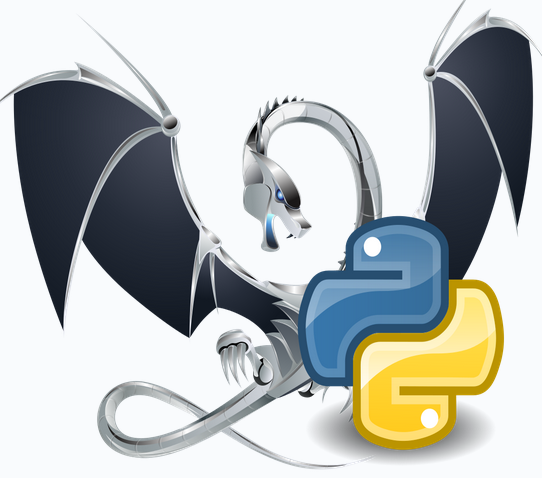
This is highly beneficial, as performance-critical tasks are often implemented in C++, while Python is used for rapid prototyping and data analysis. By bridging the gap between these two languages, cppyy allows researchers to utilize the strengths of both in their workflows. Numba can JIT compile a subset of Python code into optimized machine code using the LLVM compiler library.
Research Questions #
- What are the key challenges in enabling CUDA support within the Cppyy-Numba workflow?
- How does the performance of CUDA code generated via Cppyy-Numba compare to native CUDA C++ implementations?
Methodology #
Cppyy architecture
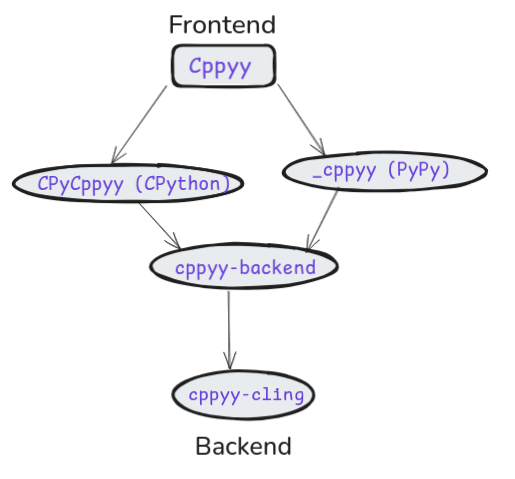
Cling CUDA support in Cppyy
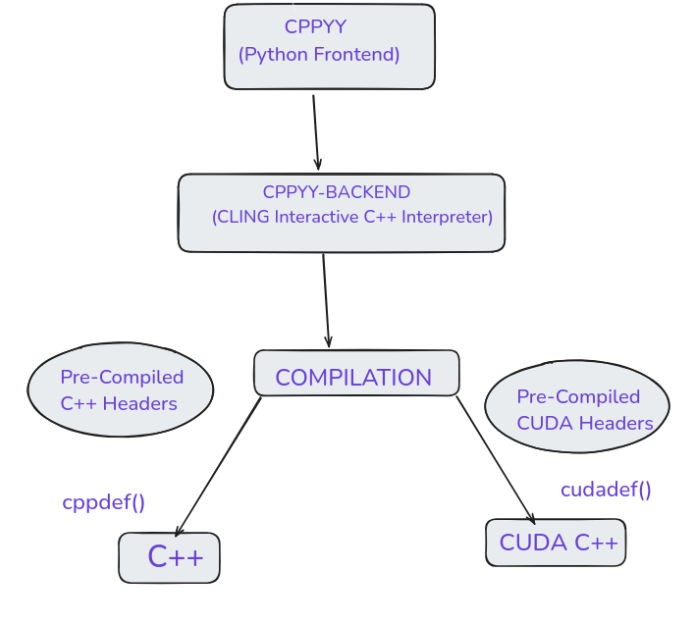
Cppyy-Numba workflow
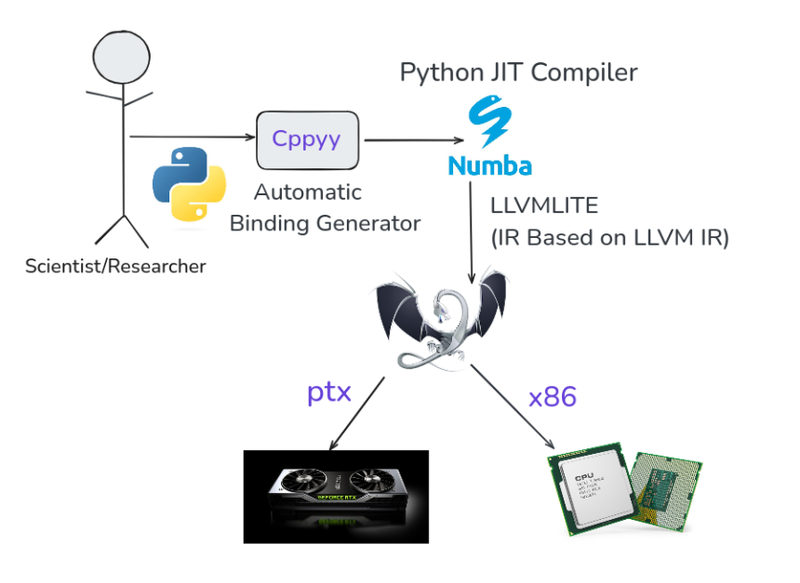
Results #
Few sample code snippets:
- Python bounded C++ code
cppyy.cppdef(‘’’
float foo(float a){
return std::fabs(a);
}
’’’)
- Python bounded C++ Device(that can run on GPUs) code
cppyy.cudadef(‘’’
__device__ float foo(float a){
return fabs(a);
}
‘’’)
- JITed python code runs on GPU
@cuda.jit()
def abs_kernel(x,out):
pos = cuda.grid(1)
if pos < x.size:
out[pos] =cppyy.gbl.foo(x[pos])
Conclusion #
The CUDA support in the Python ecosystem through Cppyy and Numba can help accelerate the research and development in Scientific Computing domains like Data analysis(ROOT), Machine Learning, and computational sciences like simulating genetic code, protein structures, etc that rely on both C++ and Python languages.
ROOT(Data Analysis Framework at CERN)

At the end of the summer program, my research poster was selected to be presented at Computing Sciences Area (CSA) Summer Program 2024 at Berkeley Lab.
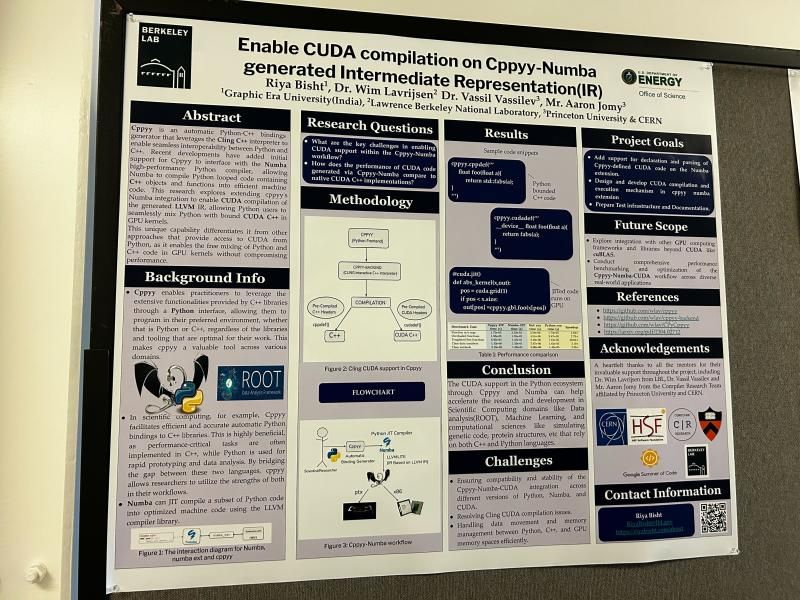
Challenges #
- Ensuring compatibility and stability of the Cppyy-Numba-CUDA integration across different versions of Python, Numba, and CUDA.
- Resolving Cling CUDA compilation issues.
- Handling data movement and memory management between Python, C++, and GPU memory spaces efficiently.
Future Scope #
- Explore integration with other GPU computing frameworks and libraries beyond CUDA like
cuBLAS. - Conduct comprehensive performance benchmarking and optimization of the Cppyy-Numba-CUDA workflow across diverse real-world applications.
References #
- https://github.com/wlav/cppyy
- https://github.com/wlav/cppyy-backend
- https://github.com/wlav/CPyCppyy
- https://arxiv.org/pdf/2304.02712
Acknowledgements #
A heartfelt thanks to all the mentors for their invaluable support throughout the project, including Dr. Wim Lavrijsen from LBL, Dr. Vassil Vassilev and Mr. Aaron Jomy from the Compiler Research Team affiliated with Princeton University and CERN.
Affiliations
